2015 Hyundai Accent transmission
[x] Cancel search: transmissionPage 28 of 425
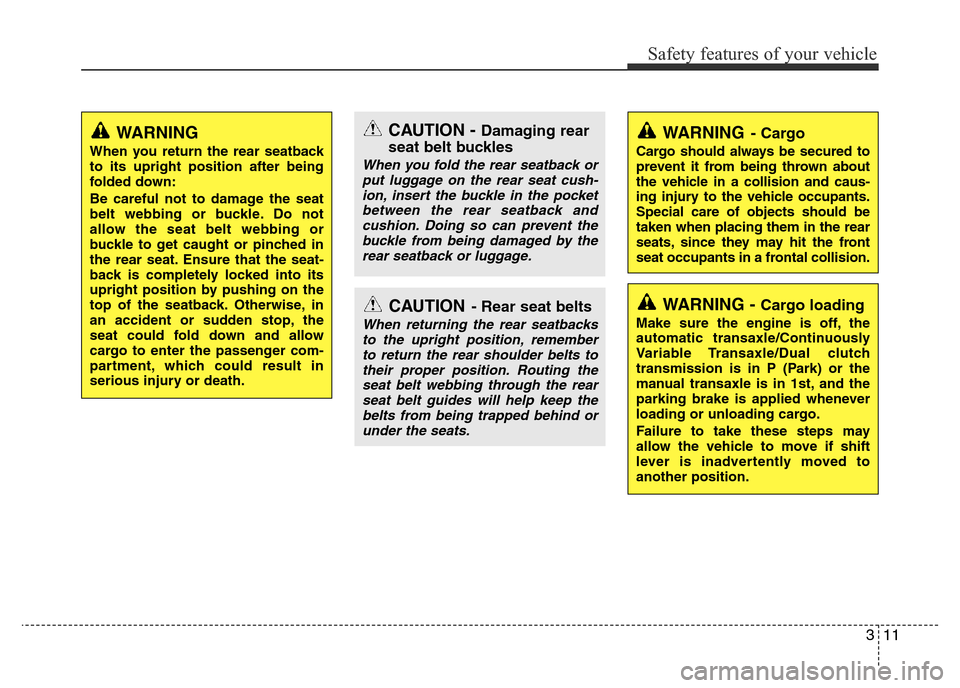
311
Safety features of your vehicle
WARNING
When you return the rear seatback
to its upright position after being
folded down:
Be careful not to damage the seat
belt webbing or buckle. Do not
allow the seat belt webbing or
buckle to get caught or pinched in
the rear seat. Ensure that the seat-
back is completely locked into its
upright position by pushing on the
top of the seatback. Otherwise, in
an accident or sudden stop, the
seat could fold down and allow
cargo to enter the passenger com-
partment, which could result in
serious injury or death.
WARNING- Cargo
Cargo should always be secured to
prevent it from being thrown about
the vehicle in a collision and caus-
ing injury to the vehicle occupants.
Special care of objects should be
taken when placing them in the rear
seats, since they may hit the front
seat occupants in a frontal collision.
WARNING - Cargo loading
Make sure the engine is off, the
automatic transaxle/Continuously
Variable Transaxle/Dual clutch
transmission is in P (Park) or the
manual transaxle is in 1st, and the
parking brake is applied whenever
loading or unloading cargo.
Failure to take these steps may
allow the vehicle to move if shift
lever is inadvertently moved to
another position.
CAUTION- Rear seat belts
When returning the rear seatbacks
to the upright position, remember
to return the rear shoulder belts to
their proper position. Routing the
seat belt webbing through the rear
seat belt guides will help keep the
belts from being trapped behind or
under the seats.
CAUTION - Damaging rear
seat belt buckles
When you fold the rear seatback or
put luggage on the rear seat cush-
ion, insert the buckle in the pocket
between the rear seatback and
cushion. Doing so can prevent the
buckle from being damaged by the
rear seatback or luggage.
Page 99 of 425
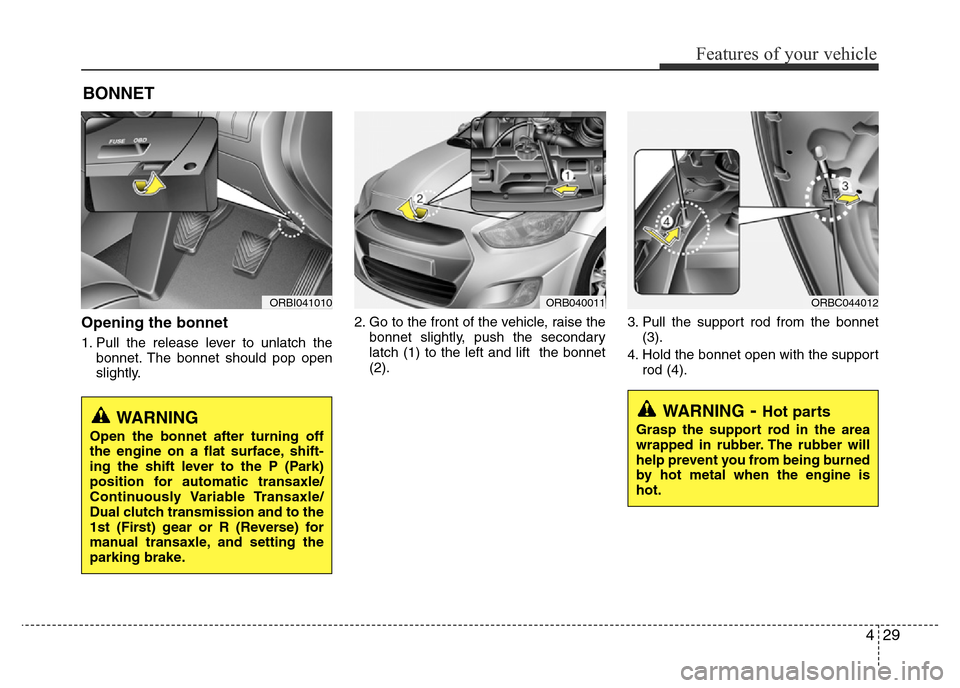
429
Features of your vehicle
Opening the bonnet
1. Pull the release lever to unlatch the
bonnet. The bonnet should pop open
slightly.2. Go to the front of the vehicle, raise the
bonnet slightly, push the secondary
latch (1) to the left and lift the bonnet
(2).3. Pull the support rod from the bonnet
(3).
4. Hold the bonnet open with the support
rod (4).
BONNET
ORBI041010ORB040011ORBC044012
WARNING- Hot parts
Grasp the support rod in the area
wrapped in rubber. The rubber will
help prevent you from being burned
by hot metal when the engine is
hot.WARNING
Open the bonnet after turning off
the engine on a flat surface, shift-
ing the shift lever to the P (Park)
position for automatic transaxle/
Continuously Variable Transaxle/
Dual clutch transmission and to the
1st (First) gear or R (Reverse) for
manual transaxle, and setting the
parking brake.
Page 121 of 425
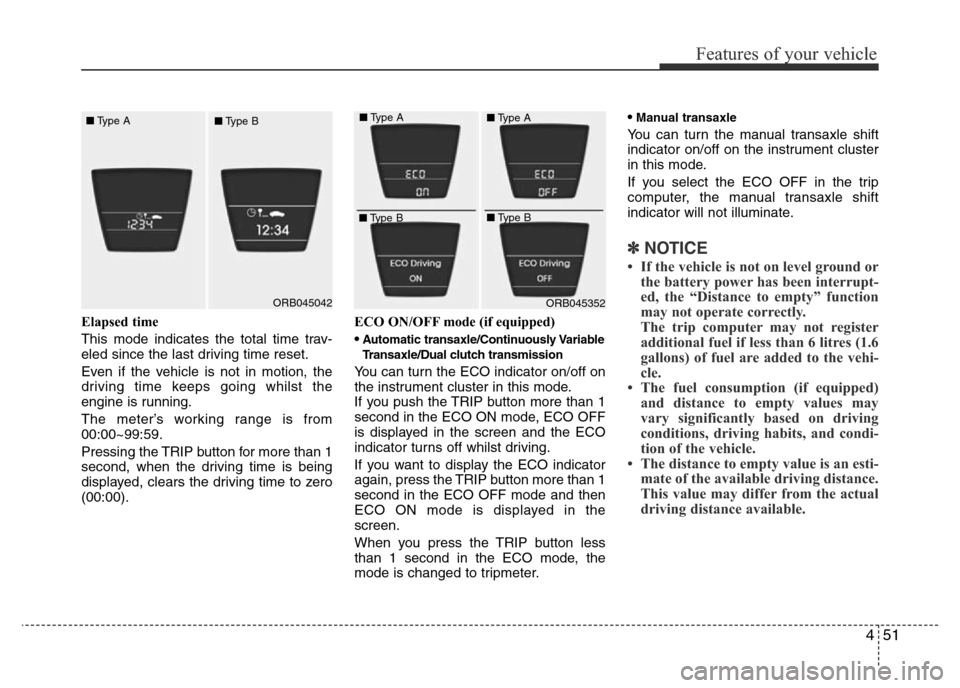
451
Features of your vehicle
Elapsed time
This mode indicates the total time trav-
eled since the last driving time reset.
Even if the vehicle is not in motion, the
driving time keeps going whilst the
engine is running.
The meter’s working range is from
00:00~99:59.
Pressing the TRIP button for more than 1
second, when the driving time is being
displayed, clears the driving time to zero
(00:00).ECO ON/OFF mode (if equipped)
•
Automatic transaxle/Continuously Variable
Transaxle/Dual clutch transmission
You can turn the ECO indicator on/off on
the instrument cluster in this mode.
If you push the TRIP button more than 1
second in the ECO ON mode, ECO OFF
is displayed in the screen and the ECO
indicator turns off whilst driving.
If you want to display the ECO indicator
again, press the TRIP button more than 1
second in the ECO OFF mode and then
ECO ON mode is displayed in the
screen.
When you press the TRIP button less
than 1 second in the ECO mode, the
mode is changed to tripmeter.•
Manual transaxle
You can turn the manual transaxle shift
indicator on/off on the instrument cluster
in this mode.
If you select the ECO OFF in the trip
computer, the manual transaxle shift
indicator will not illuminate.
✽NOTICE
• If the vehicle is not on level ground or
the battery power has been interrupt-
ed, the “Distance to empty” function
may not operate correctly.
The trip computer may not register
additional fuel if less than 6 litres (1.6
gallons) of fuel are added to the vehi-
cle.
• The fuel consumption (if equipped)
and distance to empty values may
vary significantly based on driving
conditions, driving habits, and condi-
tion of the vehicle.
• The distance to empty value is an esti-
mate of the available driving distance.
This value may differ from the actual
driving distance available.
ORB045042ORB045352 ■Type A
■Type B■Type A
■Type B■Type A
■Type B
Page 123 of 425
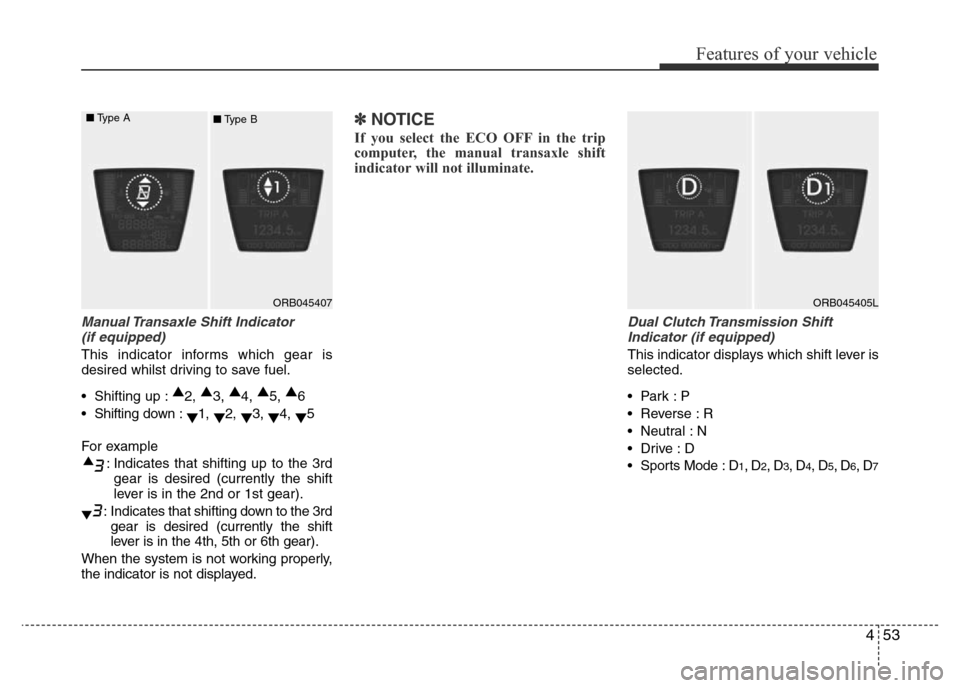
453
Features of your vehicle
Manual Transaxle Shift Indicator
(if equipped)
This indicator informs which gear is
desired whilst driving to save fuel.
• Shifting up :▲
2, ▲
3, ▲
4, ▲
5, ▲
6
• Shifting down :
▼1,
▼2,
▼3,
▼4,
▼5
For example
: Indicates that shifting up to the 3rd
gear is desired (currently the shift
lever is in the 2nd or 1st gear).
: Indicates that shifting down to the 3rd
gear is desired (currently the shift
lever is in the 4th, 5th or 6th gear).
When the system is not working properly,
the indicator is not displayed.
✽NOTICE
If you select the ECO OFF in the trip
computer, the manual transaxle shift
indicator will not illuminate.
Dual Clutch Transmission Shift
Indicator (if equipped)
This indicator displays which shift lever is
selected.
•Park :P
• Reverse : R
• Neutral : N
•Drive :D
• Sports Mode : D
1, D2, D3, D4, D5, D6, D7
ORB045407 ■Type A
■Type BORB045405L
Page 124 of 425
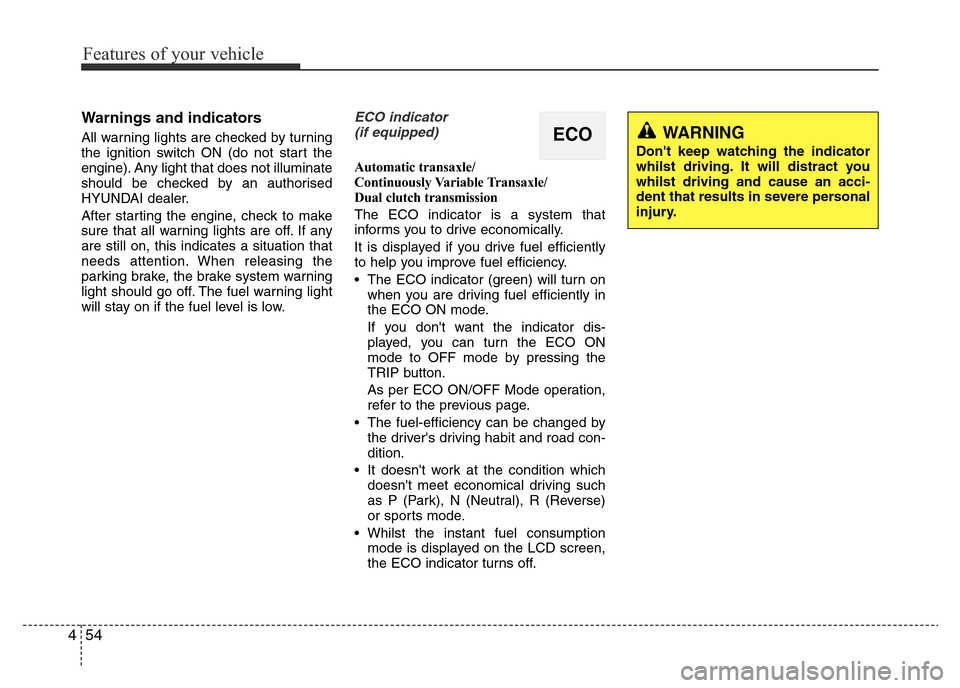
Features of your vehicle
54 4
Warnings and indicators
All warning lights are checked by turning
the ignition switch ON (do not start the
engine). Any light that does not illuminate
should be checked by an authorised
HYUNDAI dealer.
After starting the engine, check to make
sure that all warning lights are off. If any
are still on, this indicates a situation that
needs attention. When releasing the
parking brake, the brake system warning
light should go off. The fuel warning light
will stay on if the fuel level is low.
ECO indicator
(if equipped)
Automatic transaxle/
Continuously Variable Transaxle/
Dual clutch transmission
The ECO indicator is a system that
informs you to drive economically.
It is displayed if you drive fuel efficiently
to help you improve fuel efficiency.
• The ECO indicator (green) will turn on
when you are driving fuel efficiently in
the ECO ON mode.
If you don't want the indicator dis-
played, you can turn the ECO ON
mode to OFF mode by pressing the
TRIP button.
As per ECO ON/OFF Mode operation,
refer to the previous page.
• The fuel-efficiency can be changed by
the driver's driving habit and road con-
dition.
• It doesn't work at the condition which
doesn't meet economical driving such
as P (Park), N (Neutral), R (Reverse)
or sports mode.
• Whilst the instant fuel consumption
mode is displayed on the LCD screen,
the ECO indicator turns off.
WARNING
Don't keep watching the indicator
whilst driving. It will distract you
whilst driving and cause an acci-
dent that results in severe personal
injury.ECO
Page 135 of 425
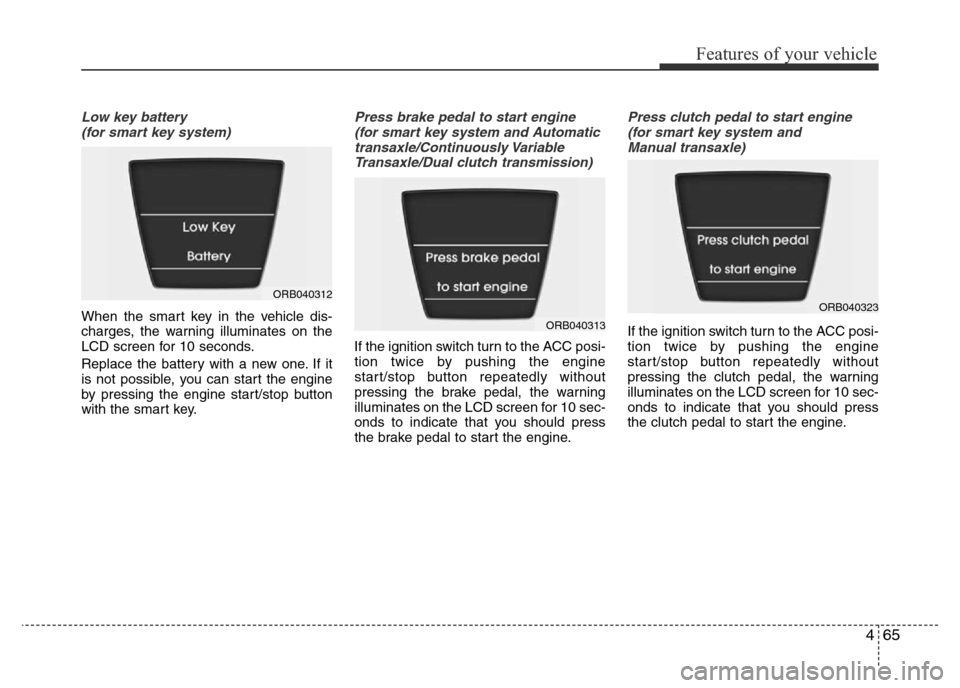
465
Features of your vehicle
Low key battery
(for smart key system)
When the smart key in the vehicle dis-
charges, the warning illuminates on the
LCD screen for 10 seconds.
Replace the battery with a new one. If it
is not possible, you can start the engine
by pressing the engine start/stop button
with the smart key.
Press brake pedal to start engine
(for smart key system and Automatic
transaxle/Continuously Variable
Transaxle/Dual clutch transmission)
If the ignition switch turn to the ACC posi-
tion twice by pushing the engine
start/stop button repeatedly without
pressing the brake pedal, the warning
illuminates on the LCD screen for 10 sec-
onds to indicate that you should press
the brake pedal to start the engine.
Press clutch pedal to start engine
(for smart key system and
Manual transaxle)
If the ignition switch turn to the ACC posi-
tion twice by pushing the engine
start/stop button repeatedly without
pressing the clutch pedal, the warning
illuminates on the LCD screen for 10 sec-
onds to indicate that you should press
the clutch pedal to start the engine.
ORB040312
ORB040313
ORB040323
Page 238 of 425
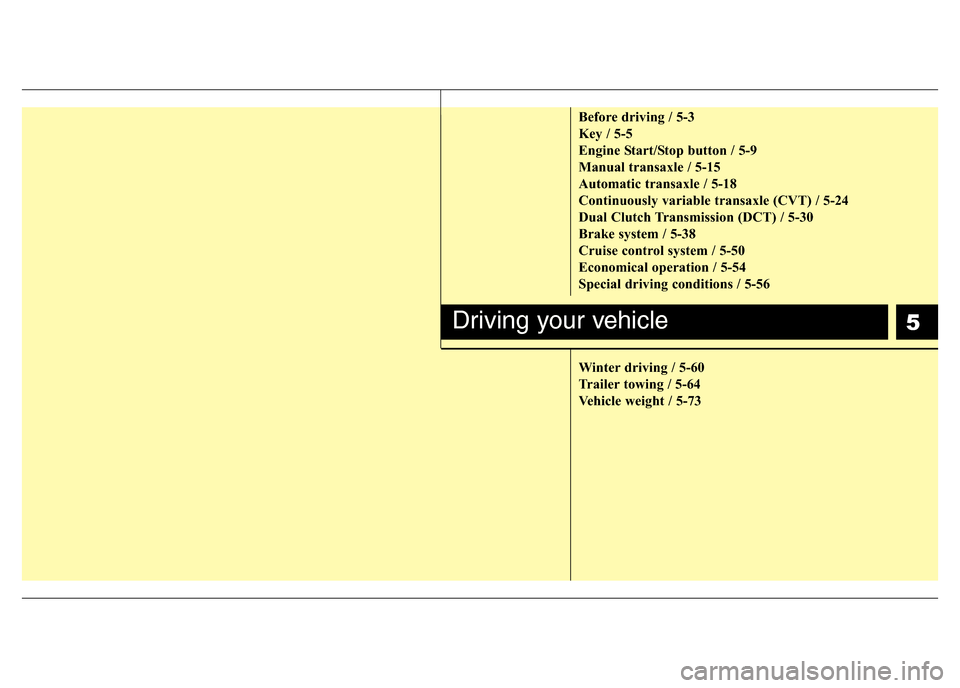
5
Before driving / 5-3
Key / 5-5
Engine Start/Stop button / 5-9
Manual transaxle / 5-15
Automatic transaxle / 5-18
Continuously variable transaxle (CVT) / 5-24
Dual Clutch Transmission (DCT) / 5-30
Brake system / 5-38
Cruise control system / 5-50
Economical operation / 5-54
Special driving conditions / 5-56
Winter driving / 5-60
Trailer towing / 5-64
Vehicle weight / 5-73
Driving your vehicle
Page 244 of 425
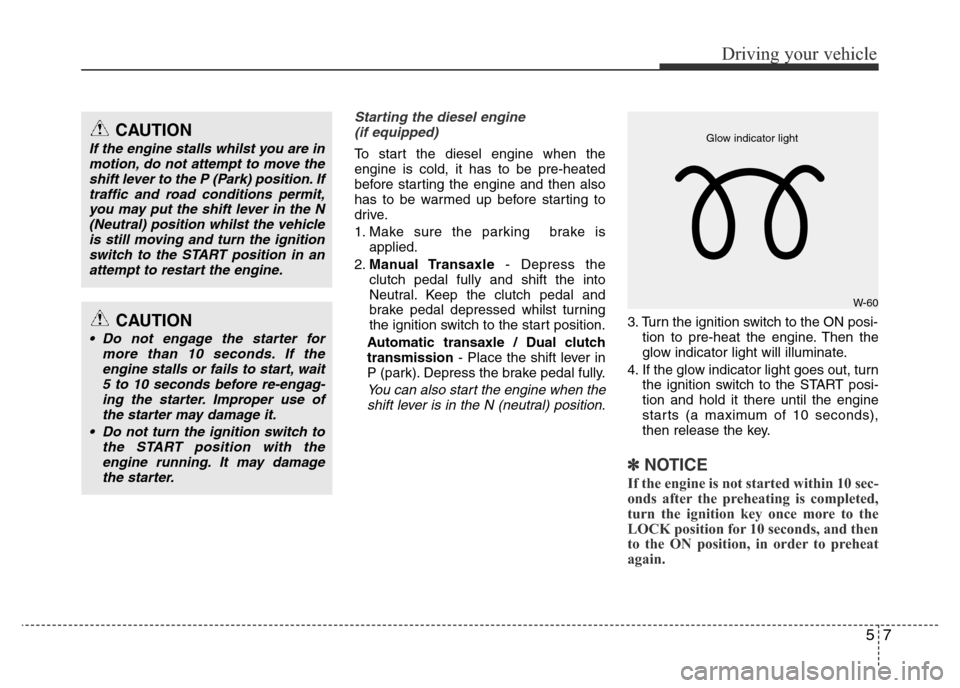
57
Driving your vehicle
Starting the diesel engine
(if equipped)
To start the diesel engine when the
engine is cold, it has to be pre-heated
before starting the engine and then also
has to be warmed up before starting to
drive.
1. Make sure the parking brake is
applied.
2.Manual Transaxle- Depress the
clutch pedal fully and shift the into
Neutral. Keep the clutch pedal and
brake pedal depressed whilst turning
the ignition switch to the start position.
Automatic transaxle / Dual clutch
transmission- Place the shift lever in
P (park). Depress the brake pedal fully.
You can also start the engine when the
shift lever is in the N (neutral) position.
3. Turn the ignition switch to the ON posi-
tion to pre-heat the engine. Then the
glow indicator light will illuminate.
4. If the glow indicator light goes out, turn
the ignition switch to the START posi-
tion and hold it there until the engine
starts (a maximum of 10 seconds),
then release the key.
✽ NOTICE
If the engine is not started within 10 sec-
onds after the preheating is completed,
turn the ignition key once more to the
LOCK position for 10 seconds, and then
to the ON position, in order to preheat
again.
CAUTION
If the engine stalls whilst you are in
motion, do not attempt to move the
shift lever to the P (Park) position. If
traffic and road conditions permit,
you may put the shift lever in the N
(Neutral) position whilst the vehicle
is still moving and turn the ignition
switch to the START position in an
attempt to restart the engine.
CAUTION
• Do not engage the starter for
more than 10 seconds. If the
engine stalls or fails to start, wait
5 to 10 seconds before re-engag-
ing the starter. Improper use of
the starter may damage it.
• Do not turn the ignition switch to
the START position with the
engine running. It may damage
the starter.
W-60 Glow indicator light